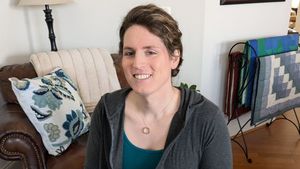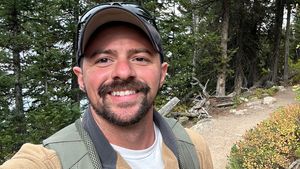The documentary Forgetting the Many: The Royal Pardon of Alan Turing opens at Cinema Village in NYC on Friday, December 6, for a one-week run. Directed by award-winning filmmaker Rosemarie Reed and narrated by acclaimed actor Ben Whishaw, Forgetting the Many examines the posthumous pardon of the World War II codebreaker Alan Turing as well as the stories of other gay men who were convicted under the 1885 British law that criminalized male homosexual acts as “gross indecency.”
Through in-depth interviews, archival footage, and personal stories, Forgetting the Many shows how these men lost their jobs, families, and dignity in their struggle for justice.
“Although none of men in the film are prominent figures like Turing, their plights are just as powerful and deserve to be on equal footing as Turing’s story,” Rosemarie Reed contends.
The documentary explores the political activism and legal efforts that eventually brought about the reforms allowing many of the men to seek pardons. However, Reed points out that “full justice still remains elusive for some as they continue the fight to expunge their records after the law’s repeal.”
The Sexual Offenses Act of 1967 was the first to grant a partial decriminalization of homosexual acts between consenting adults in England and Wales, but it wasn’t until 2003 that full decriminalization was enacted. Still, those convicted carried the stigma of a criminal record, which often adversely impacted their job prospects.
In 2009, then-Prime Minister Gordon Brown issued a formal apology for Alan Turing’s 1952 conviction for same-sex acts. Then, in 2013, Queen Elizabeth II posthumously pardoned him. This royal pardon extended only to Turing. It left thousands of other men convicted under the same and similar laws without a pardon.
In 2017, the Policing and Crime Act, amended by what became known as “Turing’s Law,” provided automatic posthumous pardons for deceased men who had been convicted of homosexual behavior that was no longer a crime. It was a long-overdue step toward justice. However, the surviving, still-living men who had been penalized by the law were left in legal limbo, still carrying the adversity of their convictions. They had to first apply to have their convictions disregarded (removed from police records) to receive a pardon. Moreover, this disregard scheme and pardon law did not cover all previous homosexual offenses. It was not until 2022, with the passage of the Police, Crime, Sentencing and Courts Bill, that the range of past same-sex offenses eligible for a disregard and pardon was broadened to cover all homosexual acts that are no longer considered crimes.
Some men remain ineligible for pardons because their offenses – such as consenting adults engaging in sex in a public restroom or a minor engaging in consensual same-sex sexual relations with another minor – remain illegal.
With films on subjects ranging from the scientific contributions of women like Irène Joliot-Curie to world leaders like Mikhail Gorbachev, Rosemarie Reed has built a career on highlighting overlooked stories. She’s particularly interested in documentaries that delve deep into historical injustices.
She was inspired to create Forgetting the Many: The Royal Pardon of Alan Turing when she realized that Turing’s 2013 posthumous pardon had “forgotten” thousands of other men convicted under the same and similar homophobic laws. Reed saw this as an ongoing injustice, and her film became a way to ensure that some of their stories were heard.
Forgetting the Many: The Royal Pardon of Alan Turing shines a spotlight on the continuing fight for justice, both in the U.K. and around the world, where similar laws and their legacies still impact lives today. While the legal battle for pardons continues, the film calls attention to the need for societal change and greater recognition of the harm done to these men.
Forgetting the Many: The Royal Pardon of Alan Turing opens at Cinema Village in NYC on Dec. 6th. For more information including showtimes and to purchase tickets visit www.cinemavillage.com.

























































































